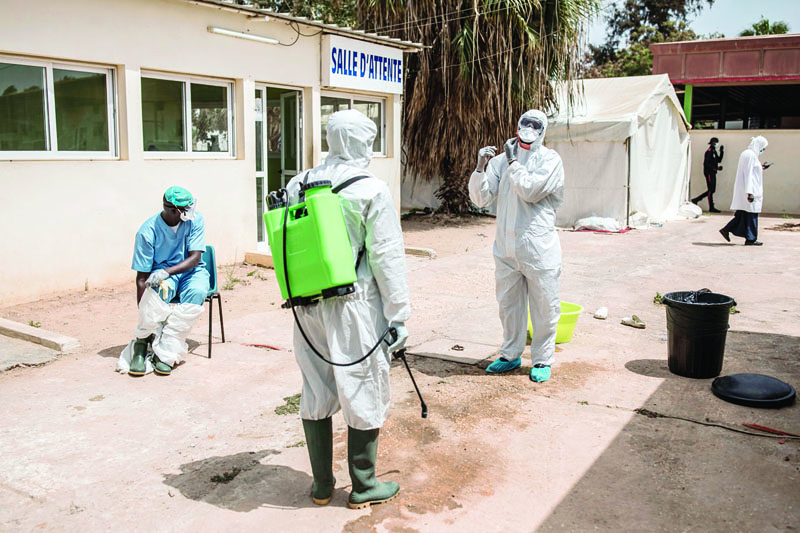
DAKAR: Across Africa, obscure or forgotten health and government officials have been propelled into the public eye because of their role in fighting coronavirus. Some are unsung veterans of previous efforts to stop epidemics, such as Ebola or AIDS. Others are from a younger generation, making a name for themselves on social media.
Zweli Mkhize, South Africa
South Africa's indefatigable health minister, Zweli Mkhize, has an upbeat motto in a video message on coronavirus aired regularly on public television: "Stay calm, focused and courageous". The doctor-turned-politician is constantly on the move across the virus-ravaged country, meeting local health staff and officials, while driving home health advice on social media and in polished television interviews. Mkhize, 64, is also a veteran of South Africa's struggle against AIDS. When he was a provincial cadre of the ruling African National Congress party, he personally wrote to former President Thabo Mbeki-a HIV/AIDS-denialist-to urge him into action. The editor of South African weekly City Press has described him as "clever, able and smart".
Yvonne Aki-Sawyerr, Sierra Leone
The mayor of Sierra Leone's capital Freetown is determined to slow the spread of coronavirus in the West African city, but she has her work cut out for her. Nearly half of the roughly one million inhabitants of the seaside capital have no access to running water, which is essential for hand-washing. Yvonne Aki-Sawyerr, 52, is pushing to provide access to water urgently. "We need to fill those gaps as (a) government and fill them very quickly," she recently told French media.
A former finance professional with a master's degree from the London School of Economics, Aki-Sawyerr is another of Africa's old epidemic warhorses. She was the director of planning for Sierra Leone's national Ebola response team, when the virus killed nearly 4,000 people in the country between 2014 and 2016, and was awarded an Order of the British Empire for her efforts. Known for her smily demeanour and her determination, Freetown's first female mayor also set a good example at the start of the coronavirus pandemic, by isolating herself for two weeks after returning from abroad.
Jean-Jacques Muyembe, DRC
Jean-Jacques Muyembe is one of a small number of people who can claim to be mangaging two epidemics of global importance. A discrete and affable man who looks younger than his 78 years, the Congolese virologist's life has been intimately linked to the Democratic Republic of Congo's ten Ebola outbreaks.
In 1976, he was one of the first to research the then-unknown Ebola virus in the field-without protective gear. He went on to play a critical role in identifying the viral haemorrhagic fever, and in finding its treatment. Muyembe is now the DRC's coronavirus front man. His upstanding image suffered damage recently, however, when he stirred controversy at home by saying he was prepared to trial a vaccine developed abroad in the Central African state. He quickly backtracked. "I am Congolese myself, and I would never let Congolese be used as guinea pigs," he said.
Moussa Seydi, Senegal
Moussa Seydi, 56, is an infectious-diseases specialist who is in charge of treating Senegal's coronavirus patients. He has drawn attention to himself for prescribing the anti-malarial hydroxychloroquine, which he suggests could be the reason for the West African country's high rate of coronavirus recovery.
The drug is controversial in some quarters, because it can potentially lead to serious side effects when administered incorrectly, and because clinical trials have not yet demonstrated whether it is an effective treatment. "I don't care about being in the limelight," says Seydi, adding that he only cares about helping patients. The son of a forklift and crane operator, Seydi wanted to be a doctor since he was a child. He now wields considerable influence among Senegalese government members. But he insists he is "really a practitioner, not a bureaucrat".
Malachie Manaouda, Cameroon
At 46, Cameroon's Health Minister Malachie Manaouda is the youngest member of the Central African state's government, and the leading figure in its fight against coronavirus. As a member of the hyper-connected generation, he updates his Twitter feed daily with reports of new infections, new medical-gear deliveries, and government health measures.
Manaouda's style is in stark contrast with most of Cameroon's government, predominantly composed of elderly men. Many appreciate his apparent modernity and willingness engage. But he has irritated others, who accuse him of stoking paranoia. After a hiatus in social-media updates in the face of this criticism, Manaouda resumed tweeting infection data on Friday. - AFP










